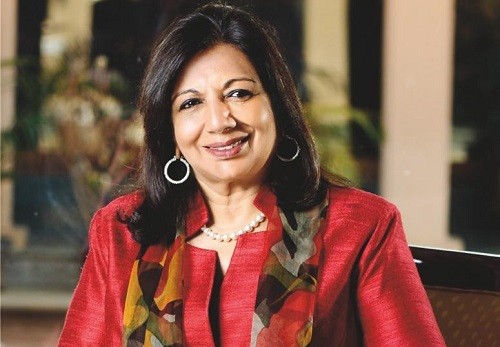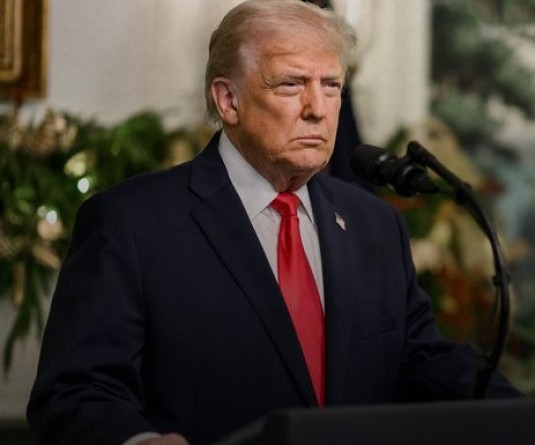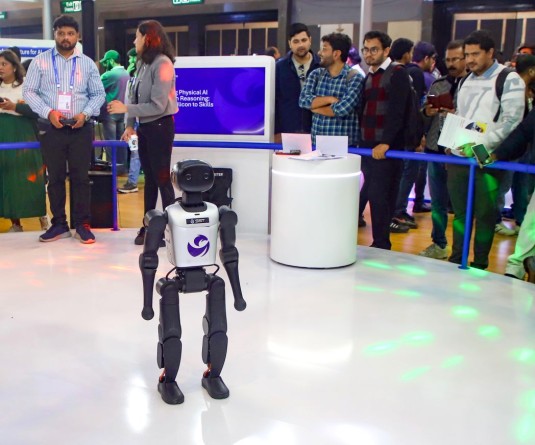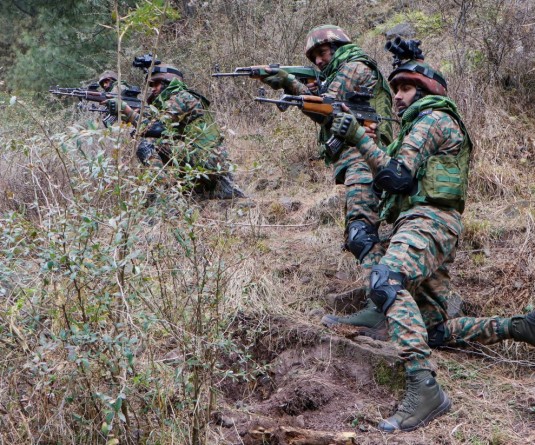
BY SHARON THAMBALA
Bengaluru, July 15 (IANS) At a time when the world is reeling under the COVID-19 health catastrophe, city-based bio-pharmaceutical major Biocon has received the approval of the Drug Controller General of India (DCGI) to market a repurposed injection, Itolizumab. It was originally launched in 2013 for treating chronic plaque psoriasis.
Costing Rs 7,950 for a 25mg/5 ml injection, Itolizumab is a novel biologic therapy which the company is recommending for emergency use in moderate to severe COVID-19 complications.
The intravenous injection is formulated and manufactured at Biocon's bio-manufacturing facility at Biocon Park here.
According to the company, DCGI has approved Itolizumab based on the results of randomized controlled clinical trials in some hospitals in Mumbai, New Delhi and also Cuba.
In an interview with IANS, Biocon's Executive Chairperson Kiran Mauzmdar-Shaw explained the intricacies involved in getting the regulator's approval and bringing Itolizumab to the masses.
Shaw is a trailblazing biotech woman entrepreneur from Bengaluru, winning several accolades globally, and also being honoured with the Padma Bhushan in India:
Q: How much time did Biocon save following the DCGI waiving off phase III clinical trials to launch Itolizumab?
A: If we did a 100-patient trial on Itolizumab, it would have taken us three months. We had state governments asking for this drug because they saw their doctors use it off-label and save lives.
We thus saved several crucial months in bringing to physicians and patients in India our novel biologic therapy, which significantly reduces mortality in moderate to severe ARDS (acute respiratory distress syndrome) patients hospitalized with COVID-19.
Q: Why did DCGI exempt Biocon's Itolizumab from Phase-III clinical trials?
A: The COVID-19 pandemic is creating havoc worldwide with over 5.73 lakh deaths reported globally. In India, the death toll is fast approaching the 24,000 mark.
The disease has been observed to cause respiratory complications as a consequence of exaggerated immune response of the host, leading to a 'cytokine storm' that results in a high mortality rate.
In such a scenario, Itolizumab has shown significant results in a pivotal clinical study. During a public health emergency, the drug regulator can on a case-by-case basis exempt a company from conducting Phase III clinical trials based on recommendations of the Subject Expert Committee.
Biocon created a design model of a clinical trial based on statistical modelling, which could show significant difference between the trial arm and the control arm.
In this clinical trial, 20 patients on the trial arm recovered, while three patients on the control arm died. The results from the pivotal Phase II study were statistically significant and compelling enough for Itolizumab to receive 'restricted emergency use' approval from the DCGI for moderate to severe COVID-19 complications.
In line with the DCGI's terms for 'restricted emergency use' approval, we will be initiating a Phase IV (post-marketing) clinical study for Itolizumab with a larger sample size.
This is a label extension of our existing product, Itolizumab, which was approved for psoriasis in 2013 after Phase 1, 2 and 3 trials.
The drug has been in use since 2013 and tested on at least 500 patients for psoriasis, so we have a lot of safety information over the last seven years.
Apart from 20 patients who recovered in the clinical trial, many doctors and investigators in many parts of the country decided to use Itolizumab available in the market in a bid to try and save patients.
So far, over 150 patients have been rescued with Itolizumab in Maharashtra, Gujarat and Delhi after being treated under compassionate use by many doctors.
We will be publishing the trial data as well as real world data to further strengthen the body of evidence for Itolizumab.
Q: Is repurposing drugs very common? Has Biocon done it earlier?
A: Given the seriousness of the COVID-19 emergency, pharmaceutical companies globally are looking to repurpose drugs to save lives.
Since there is currently no treatment for COVID-19, a majority of the current treatment options under study are basically drugs that are being 'repurposed' to fight the disease.
Hydroxychloroquine is an antimalarial drug that is being repurposed for COVID-19. Tocilizumab is an immunosuppressive drug used mainly for the treatment of rheumatoid arthritis and that is being repurposed for COVID-19.
Yes, Biocon recently received the DCGI's approval for an extracorporeal blood purification (EBP) device CytoSorb to reduce pro-inflammatory cytokines levels in confirmed COVID-19 patients admitted to the intensive care unit (ICU) with confirmed or imminent respiratory failure.
The company was granted license for emergency use of CytoSorb in public interest by the Indian health regulator to treat COVID-19 patients who are 18 years of age or older.
In April, the US Food and Drug Administration (FDA) granted Emergency Use Authorization (EUA) to CytoSorb for use in patients with COVID-19 infection.
Q: How much time does it take to repurpose a drug?
A: The timelines will depend upon many factors such as the nature of the proposed drug, the availability of data for the repurposed drug. So, it could take approximately 4-8 months to repurpose a drug.
Q: Generally how many phases of clinical trial are there and how long does it take?
A: Phase-I, Phase-II, Phase-III and Phase IV, which is after marketing authorisation. A full clinical trial can take several years depending on the molecule and disease it is targeting.
Moreover, the regulatory timeline for approval after each phase of a clinical trial is 90 days for a general clinical trial or else 30 days for indigenously developed products.
Q: Is waiving off clinical trial phases very common?
A: In an emergency health situation, the Central Licensing Authority may waive study requirement where the drug is indicated in a life-threatening or serious diseases or diseases of special relevance to the Indian health scenario or for a condition which is an unmet need in India such as XDR tuberculosis, Hepatitis C, H1N1, dengue, malaria, HIV, or for the rare diseases for which drugs are not available or available at a high cost or if it is an orphan drug.
Also, given the enormity of the novel coronavirus pandemic, drug regulators globally including DCGI are trying to expedite the discovery and production of a COVID-19 drug or vaccine.
In India, the CDSCO, in a notification dated March 19, 2020, has said: "In order to encourage R&D of drug or vaccine for prevention or treatment of COVID-19, any application submitted to CDSCO will be processed on high priority."
It goes on to say: "Any firm or research institute having protocol for repurposing of existing drugs/vaccines for treatment of COVID-19 will also be given priority for review and approval."
"Data requirement for animal toxicity study, clinical study, stability study etc may be abbreviated, deferred, or waived on a case-to-case basis depending upon the type of vaccine, nature of drug, plant from which the drug is extracted and its experience in case of phytopharmaceuticals," the notification adds.
Q: What efforts did Biocon make to create a medicine for COVID-19?
A: Looking at the gravity of the crisis and driven by the mission to save lives and help reduce the mortality rate due to COVID-19, Biocon repurposed its existing approved and in-market novel biologic drug, Itolizumab, and demonstrated through a pivotal clinical trial that its unique mechanism of action can bring down mortality in moderate to severe (acute respiratory distress syndrome (ARDS) patients due to COVID-19.
Q: What do you mean by restricted emergency use?
A: Under 'restricted emergency use', a regulatory agency may allow an investigational drug or unapproved uses of an approved drug to be used in an emergency to diagnose, treat or prevent serious or life-threatening diseases or conditions or pandemics when there are no adequate, approved and available alternatives.
The 'restricted emergency use' comes with certain conditions like effective monitoring of patients and obtaining patient consent forms before administration of the drug. This kind of approval is granted if such a drug has shown significant results from earlier and ongoing studies.
Q: What about phase IV clinical trials?
A: Biocon Biologics has received 'restricted emergency use' authorisation, and as per that the DCGI has recommended for a Phase IV (post-marketing) clinical study.
We will be conducting the Phase IV trial for Itolizumab with a larger sample size. We will share the trial data and other relevant data with the regulator.
Q: Why is Itolizumab so expensive? (Rs 7,950 per 25 mg/5 ml injection)
A: It is not accurate to term Itolizumab as 'expensive.' Itolizumab does the job of preventing a CIVID-19 patient from having to be put on the ventilator. Administering Itolizumab to a patient can reduce three to four days in ICU on a ventilator, which can be far more expensive.
Q: Was Itolizumab's efficacy evaluated in Cuba also?
A: Biocon's partners in Cuba had simultaneously begun trials on the drug, and obtained positive results as well. In Cuba, 76 COVID-19 patients were treated with Itolizumab.
At the end of the trial, 79 per cent of the severely ill patients were discharged from the ICU after 14 days of treatment, while moderately ill patients showed a reduction in the rate of disease progression.
(Sharon Thambala can be contacted at thambalasharon@gmail.com)






